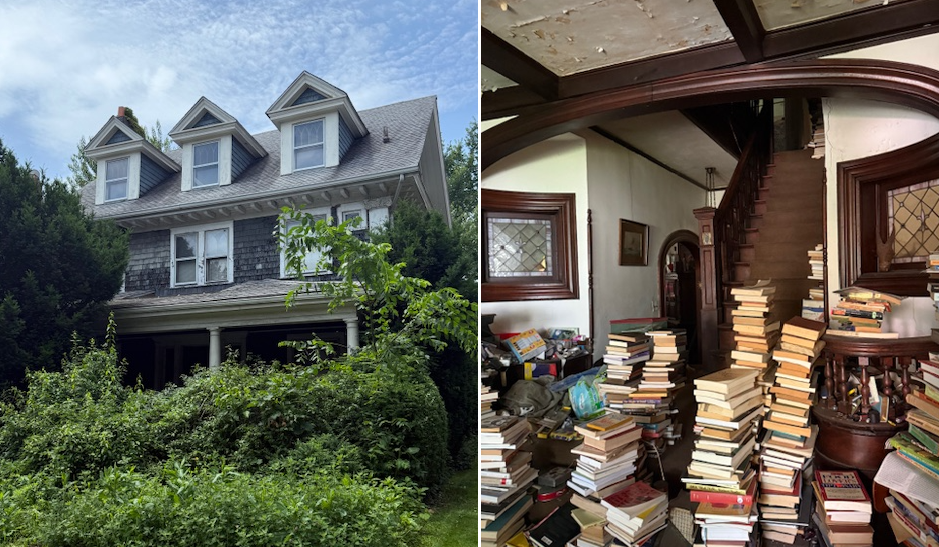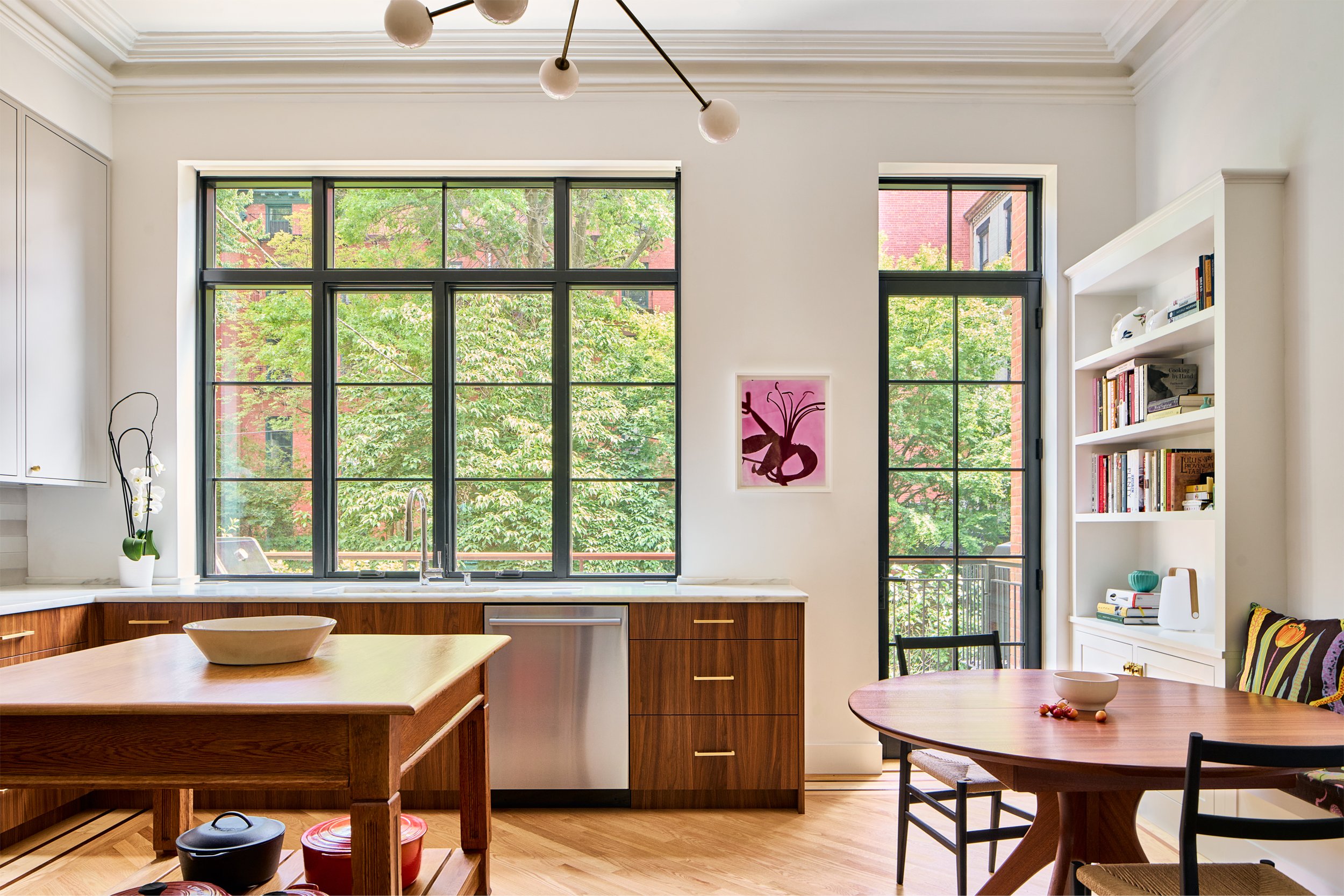Brooklyn Co-Housing Moving Closer to Reality?
Co-ops, until the recent condo building boom, were once a dominant form of housing here in New York, but many found they weren’t actually that, you know, cooperative. So a Brooklyn couple is trying to bring another form of housing to the borough, a Danish model of communal living called co-housing. So says Sarah Ryley…


Co-ops, until the recent condo building boom, were once a dominant form of housing here in New York, but many found they weren’t actually that, you know, cooperative. So a Brooklyn couple is trying to bring another form of housing to the borough, a Danish model of communal living called co-housing. So says Sarah Ryley in the Real Deal. Individuals own their own units in co-housing, like co-ops, but there are shared communal spaces, usually including kitchens and dining areas where residents can eat together. Most American co-housing communities are in rural areas, but in February Alex Marshall incorporated Brooklyn Cohousing LLC. He’s got about 25 interested households, and they’re looking for property between $15 and $35 million for the group. Is Brooklyn ready for such communal living, and will the market provide?
Living Closely With Neighbors [The Real Deal]
Co-housing Sketch. Photo by matthewsargent.





if any of you are interested in learning more about us we are hosting the following free public event this coming Friday:
Mary Kraus of Kraus-Fitch Architects will give a free public slide show and lecture about Cohousing communities around the country and their design on Friday, Sept. 5, at 6 pm at the Brooklyn Friends Meetinghouse at 110 Schermerhorn Street in downtown Brooklyn. Free, no reservation needed. Meet the people who are currently building a cohousing community in Brooklyn, and looking for new members. Sponsored by the Brooklyn Cohousing group. For more info see http://www.brooklyncohousing.org.
I think you will find us to be pretty low key group. Btw every unit will have its own kitchen like any apt. We will have a common kitchen for community events, kids parties etc.. Though the point is to live in an intentional community, the extent to which individuals use the common spaces or participate in community activities will be totally up to them.
Heather- my sister and her family have lived in Amalgamated for years. I was just up there yesterday. People really love living there, the grounds are well kept and families like it so well that several generations often stay. Her in-laws live there, her husband grew up there and their kids want to live in their own apartments in Amalgamated. Sure there are issues (mys sister used to be on the board so I heard an earful) but by and large I think Amalgamated has to be considered a hugely successful model.
Maybe we as a society still need to find the successful balance between our legendary American individualism and the need to work for the greater good (local to global). I’ve seen and worked with people who have done that, and yes with all the attendant problems and crankiness. It’s not for everyone and doesn’t have to be- it’s just another option.
“They are very different because gated communities and condo associations are exclusionary groups based on a circle the wagons approach to living. You have to have a certain level of assets and then they are all about protecting their stuff, and protecting their neighbors stuff- as long as it is in their self-interest.”
I’m not seeing a difference between that and the co-housing model described in the Real Deal article, frankly. Although I am very amused that Mr. Polemicist Roarke thinks I’m Chairman Heather.
And, as I alluded to in my earlier posts, I do actually have some personal experience with co-housing. And I freely admit, that has given me a bias… against it. I’m just trying to tell you why, in my own experience, the communal living has some issues.
As a way to market — ahem, transform a failed condo project? Sure, sounds great. More power to you. It’s just when the rhetoric gets full of phrases about “like-minded people” and so on, that I get leery. Also, reaching decisions by consensus? I laugh. I’ve seen this not work. A lot. You may think you’re like-minded, until you realize that your perfectly nice neighbor down the hall thinks that seventh generation cleaning products are actually just a marketing scam and the only real way to clean things is with distilled white vinegar. That you distill yourself. And why can’t the association make a still for that purpose? Don’t you all want to get along?
And so on.
Something interesting historically that might be worth looking at are the co-op developments on the LES — Amalgamated and so on. They have their issues, but they’re still run pretty successfully in the spirit of this model on a large scale. (I think.)
pss11211
The typical Brownstoner poster generally is actually quite conservative in most regards, i.e. they prefer things to remain as they are. There is little in the way of ideology, simply a resistance to change – no matter what the form.
pss11211- as sam will tell you I would be one of the first to sign up for the prepaid dishwasher as I am a slacker in the kitchen. (Also the prepaid cook if one is available). And I so rarely agree with Polemicist I broke out in a rash as I am typing that on this subject I agree with him.
heather wrote:”creating a separatist utopia isn’t going to solve anyone’s problems. It’s just another way to make yourself feel special. Nor is fragmenting said society into a precious little series of islands filled with like-minded people. That is no different than gated communities and condo associations in the suburbs”
They are very different because gated communities and condo associations are exclusionary groups based on a circle the wagons approach to living. You have to have a certain level of assets and then they are all about protecting their stuff, and protecting their neighbors stuff- as long as it is in their self-interest. My parents lived in one in Florida- the concept was “keep everyone else out.” At some level they are based on fear (IMHO) and that determines their rules and regulations. And let me just say for the record, I’m not passing judgment on that. I don’t like the idea of gated communities but if that’s how someone wants to live, it’s their right.
By contrast co-housing and communes (as I see it) are based on people looking for practical solutions to sharing resources and living a cleaner, more ecologically sound life. That’s not just a some pie in the sky goal, it’s attempting to deal with a big big issue that too many of us refuse to consider. Utopias are impractical communities based on people living according to certain rigid ideals (determined in some vague manner) that will often conflict with the realities of life- none of the communities mentioned seem that way.
Based on what those who have experience with communes have said, living in a commune is about choices in lifestyle, not elitism, not selfishness. And what’s so bad about living among like minded people who want a cleaner, healthier and more social planet? It helps everyone- even those who don’t participate. If you live in a gated community, any benefit is strictly and jealously guarded for those who live there.
“we “Made Money Like Capitalists and Spent It Like Socialists.” Got a problem with that? If so, then don’t participate.
However, I don’t believe that Free-Market Global Capitalism is in that great shape right now. Do you? Do you like the idea of “socializing the risk and privatizing the profits”? I don’t.”
Glad you said that- although you might get your head bitten off here. I agree with you on this- although most people still react to the buzzwords of “capitalism” and “socialism” as though Stalin was at the gates. Your version of socialism certainly ain’t “my father’s socialism.”
“Blame Capitalism”?
Both of the communities that I’ve lived in functioned very well within Capitalism, thank you very much! Extremely well! In fact, in Kerista, (where we joked that we were a “cult of accountants”) one of our many mottoes was that we “Made Money Like Capitalists and Spent It Like Socialists.” Got a problem with that? If so, then don’t participate.
However, I don’t believe that Free-Market Global Capitalism is in that great shape right now. Do you? Do you like the idea of “socializing the risk and privatizing the profits”? I don’t. I think the only time companies that fail should be bailed out by MY taxpayer dollars is if those companies are then nationalized. Now there’s a novel idea! Or are you comfortable with the kleptocracy the way it is?
I liked this line: “Co-housing represents a small step towards people attempting to solve problems for themselves in their own way.” I don’t understand why this concept is so difficult and so foreign. It’s a choice, and has very little to do with who does the dishes.
And finally… “why are you here again (in one of the most expensive cities in the world) and what do you do for a living?”
I’m here because it’s interesting. New York is my home and I love it. Does that mean that I have to live the way everyone else here does? I don’t have to be ironic or cynical all the time, do I? I don’t have to aspire to simply accumulating as much personal wealth as possible, right?
And what do I do for a living? Well, right now I’m sitting in a real estate office, and I’m a licensed salesperson. (it’s slow these days) I got into this industry because I know a lot of my neighbors, am very familiar with my neighborhood, and wanted to try to find the formula or formulas for using a real estate approach to building small intentional communities. Those formulas (and there are several) are just within my reach, and Brooklyn Co-Housing is an inspiration.
p.s. – I love the idea of a community for people who like to pay other people to wash their dishes. I think that’s a great idea, and would probably do quite well in the marketplace! 🙂
Heather, you obviously don’t follow real estate development in this city or read my posts. Rent stabilized buildings always make poor redevelopment properties. The costs are simply enormous. While co-op conversions exist, it is purely because the landlord just doesn’t want to deal with the hassle and wants to liquidate his position with the best possible return. The co-housing people are not looking to buy a building and convert it. If you read about it, you’d know this. They are interested in building something from the ground up that accommodates their personal desires. This is not going to be possible with some ancient building.
The problem with large scale real estate development is it is oriented towards the most probable buyer – this is why new product is essentially generic. Co-housing is nothing more than prospective buyers operating as a developer and building what THEY want. You know all those unique, interesting, and whimsical townhouses in this city? They were built by people with the same motivations.
In any event, your feelings on this matter are completely irrational and the level of emotion you exude in your writing borders on the psychotic. Your writings honestly sound like something from Mao during the cultural revolution. Very scary.
I really can’t possibly refute anything you have written as it is completely baseless. You have done nothing more than project your personal, paranoid biases onto something of which you know absolutely nothing.
Where else are you going to find a suitable dwelling, Polemicist, if not a large apartment complex that will have rent-stabilized tenants? This is New York. Any building large and cheap enough is going to already have people living in it. What happens to them? What if they don’t “share” your mentality?
“‘Co-housing’ is not a project ‘by’ certain people ‘for’ others. It is a project by specific people for themselves and no one else.”
And that’s the problem with it. I realize that you, Polemicist, who think half the working class population of New York city are leeches on society, aren’t going to get this, but creating a separatist utopia isn’t going to solve anyone’s problems. It’s just another way to make yourself feel special. Nor is fragmenting said society into a precious little series of islands filled with like-minded people. That is no different than gated communities and condo associations in the suburbs, the kind you probably roll your eyes at and sneer.
Something more productive to do, (were you actually delusional enough to think that any of this makes a difference), would be to find commonality with the neighbors you have now. But, oh, right. They just don’t understand your specialness.
Also Heather, I totally missed your comment about rent stabilized tenants. How on earth is that at all relevant to this discussion?